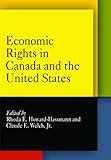Economic Rights in Canada and the United States / ed. by Claude E. Welch, Jr., Rhoda E. Howard-Hassmann.
Material type: TextSeries: Pennsylvania Studies in Human RightsPublisher: Philadelphia : University of Pennsylvania Press, [2011]Copyright date: ©2006Description: 1 online resource (288 p.)Content type:
TextSeries: Pennsylvania Studies in Human RightsPublisher: Philadelphia : University of Pennsylvania Press, [2011]Copyright date: ©2006Description: 1 online resource (288 p.)Content type: - 9780812220933
- 9780812204780
- 330
- online - DeGruyter
- Issued also in print.
| Item type | Current library | Call number | URL | Status | Notes | Barcode | |
|---|---|---|---|---|---|---|---|
 eBook
eBook
|
Biblioteca "Angelicum" Pont. Univ. S.Tommaso d'Aquino Nuvola online | online - DeGruyter (Browse shelf(Opens below)) | Online access | Not for loan (Accesso limitato) | Accesso per gli utenti autorizzati / Access for authorized users | (dgr)9780812204780 |
Frontmatter -- Contents -- Introduction. Looking at Ourselves -- Part I. Philosophy, Law, and Politics of Economic Rights -- Chapter 1. Justifying Socioeconomic Rights -- Chapter 2. International Law of Economic, Social, and Cultural Rights -- Chapter 3. On the Margins of the Human Rights Discourse -- Part II. Poverty -- Chapter 4. Homelessness in Canada and the United States -- Chapter 5. Welfare Racism and Human Rights -- Chapter 6. The Movement to End Poverty in the United States -- Part III. Contentious and Emerging Issues -- Chapter 7. So Close and Yet So Different -- Chapter 8. International Labor Rights and North American Labor Law -- Chapter 9. Deconstructing Barriers -- Chapter 10. The Economic Rights of Migrant and Immigrant Workers in Canada and the United States -- Part IV. A European Comparison -- Chapter 11. The Netherlands -- Appendix 1. International Covenant on Economic, Social and Cultural Rights -- Appendix 2. Excerpts from President Franklin Delano Roosevelt's State of the Union Address, January 6, 1941 -- Appendix 3. Excerpts from President Franklin Delano Roosevelt's State of the Union Address, January 11, 1944 -- Abbreviations -- Notes -- Contributors -- Index -- Acknowledgments
restricted access online access with authorization star
http://purl.org/coar/access_right/c_16ec
Readers in Western developed countries are most familiar with abuses of political and civil rights, but the international human rights regime also embraces a set of laws regarding economic rights. These rights include the right to work and to just and favorable working conditions; the right to join and form trade unions; the right to social security; specific rights for the family; the right to an adequate standard of living, including food, clothing, housing, and "the continuous improvement of living conditions"; and the right to "the highest attainable standard of physical and mental health."In original essays by scholars senior and junior, this volume explains how these rights are realized-or violated-in Canada and the United States. Contributors analyze the philosophy, law, and politics of economic rights and discuss specific issues such as poverty, health care, and the rights of people with disabilities. Central to the problems of both countries are the human rights abuses evident in all contemporary capitalist societies. When the inequalities among citizens are not cushioned by a national commitment to economic rights, or when governments fail to maintain social safety nets for all citizens, economic rights are at risk.Contributors consider the problem from the perspective of their own countries: Canada, the United States, and, for contrast, the Netherlands. They do so in order to explore whether their own countries fall short of meeting international standards of economic rights. They also address the criticism often made by non-Western scholars of human rights-that their Western colleagues preach human rights abroad without regard to the human rights flaws at home.
Issued also in print.
Mode of access: Internet via World Wide Web.
In English.
Description based on online resource; title from PDF title page (publisher's Web site, viewed 24. Apr 2022)


